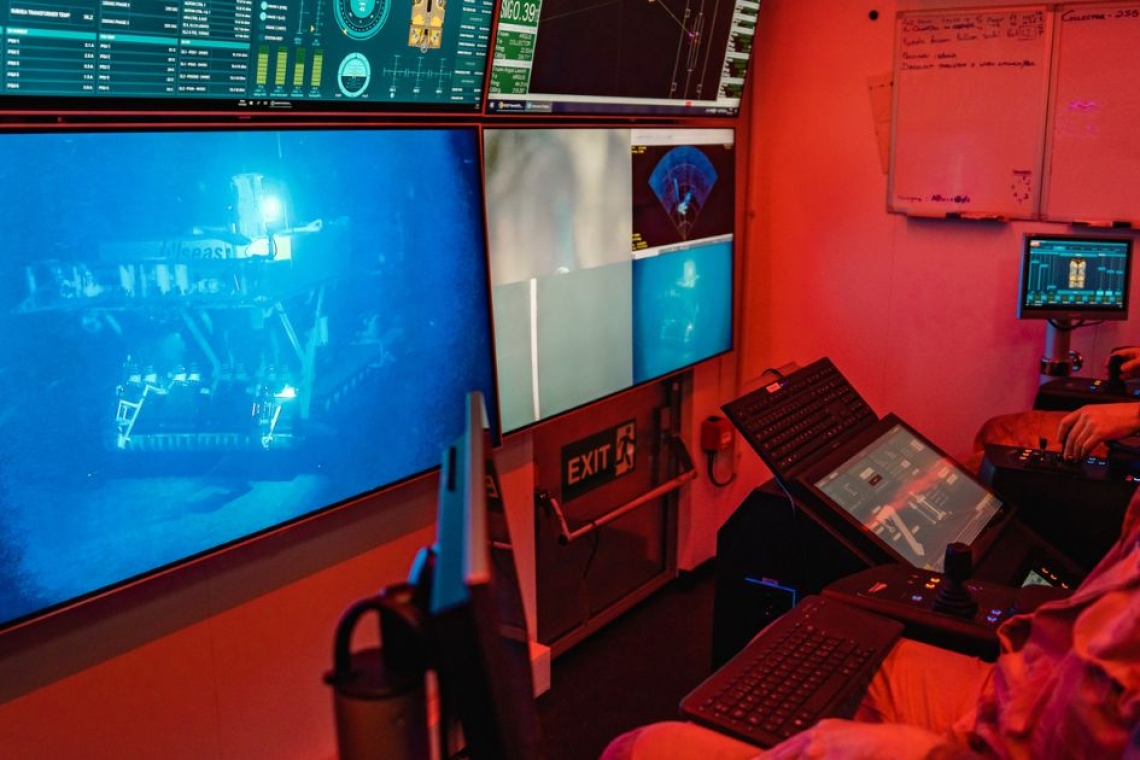TMC and Kongsberg Digital Announce Next Phase of Agreement to Bring AI and Hybrid Machine Learning to Future Deep-Sea Nodule Collection Operations

TMC the metals company Inc., an explorer of lower-impact battery metals from seafloor polymetallic nodules, announced that it had entered into the next phase of its relationship with Kongsberg Digital, a Norwegian leading software company that unlocks the value of data for customers within the maritime, energy, renewables, and power grid industries, to further develop the Digital Twin of the deep-sea operating environment of NORI Area D.
Following the successful trials of the prototype Digital Twin during test mining conducted by TMC subsidiary Nauru Ocean Resources Inc. (NORI) in 2022, the parties will now build upon the system’s capabilities by incorporating additional data streams which will be used to train AI models to determine key outcomes of its full production system, including the environmental impacts of robotic collectors operating on the seafloor.
Ahead of NORI’s expected first production in Q4 2025, the extensive range of data gathered throughout the water column by a suite of marine sensors and ingested into the Digital Twin will enable 3D visualization of deep-sea operations in a dynamic dashboard for review by stakeholders. The Company believes its AI-driven virtual operating environment will enable one of the most transparent natural resource projects in history.
Gerard Barron, Chairman and CEO of The Metals Company, said: “The Digital Twin and AMS will bring unprecedented visibility to our NORI-D nodule project, enabling the regulator and stakeholders to see exactly what we are doing, and when and where we’re doing it. This is the world’s first digital twin for subsea nodule collection and in the future, when combined with our AMS, there is potential for this system to enable operational optimization and transparency across other projects, whether in the deep sea or on land. This is a mission-critical system for us, and we could not have chosen a better, more experienced partner than Kongsberg Digital, who proved during test mining last year that they are well up to the task.”
Andy Jones, Chief Technology Officer for The Metals Company, said: “The hybrid machine learning capability enabled by Kongsberg Digital’s Kognitwin is important to our future deep-sea operations and environmental monitoring as it provides us with the proven accuracy and reliability of physics-based modelling combined with data-driven models for near real-time predictions and optimizations. This AI-driven approach will enable continuous learning and adaptation and enable us to test ‘what-if’ scenarios, allowing NORI to optimize for efficient operations while minimizing environmental impacts.”
“In the case of NORI-D there is expected to be an immense amount of live operational sensor telemetry feeding into the system. For example, an interactive web-based dashboard might show a mine plan of the collector vehicle on the seabed, in conjunction with the production vessel and a Remotely Operated Vehicle (ROV) all moving synchronously along the same paths over time. Hovering the cursor over the collector vehicle can callout its speed, direction, depth, efficiency metrics at any point in time. The regulator will also be able to monitor the plume attributes in near-real time, and operators can make adjustments based on this data and conduct simulations to maintain plume dispersal within predetermined thresholds.”
The Company plans to build out its AMS as a state-of-the-art, iterative, and predictive system that will use environmental and operational data to enable TMC to keep its deep-sea activities within ecological thresholds expected to be set by the International Seabed Authority. The AMS will draw on expert opinion and hybrid machine learning to improve operational efficiencies and potentially reduce environmental impacts over time.
TMC believes that the AMS that it is currently developing has potential applications beyond the nodule collection industry and may look to explore these in the future.

